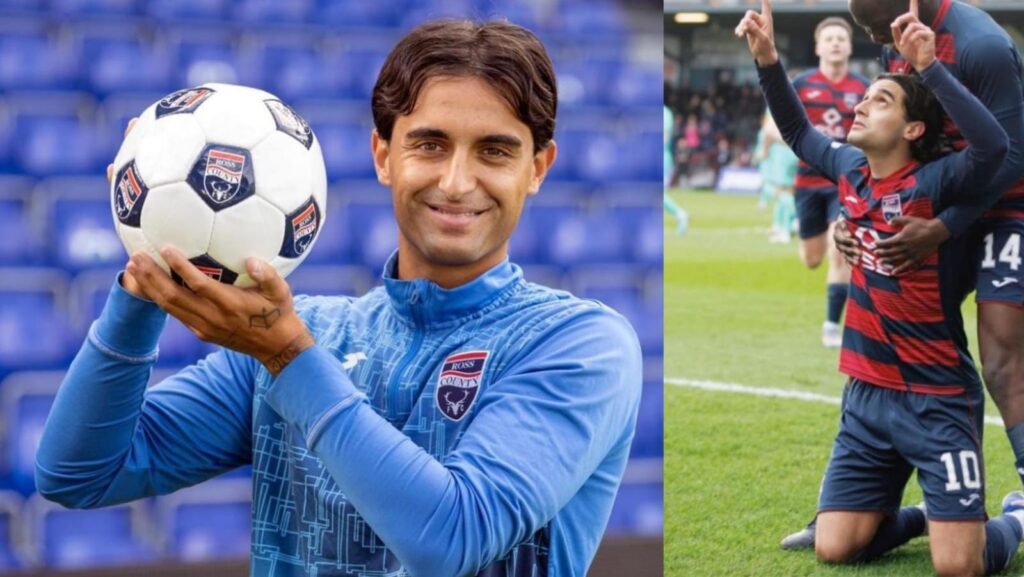
Morocco’s dream run to the World Cup semifinal in 2022 was primarily inspired by stars like Achraf Hakimi, Sofian Amrabat and Hakim Ziyech who have played all their football overseas. India’s current policy of not considering OCI-card holders, with experience of playing in much stronger leagues than the ISL, for national-team selection is surely counter-productive.
Yan Dhanda, born in Tipton in the United Kingdom’s West Midlands, has kicked off quite a debate on social media over the past few days. Rio Ferdinand, the defensive lynchpin of Sir Alex Ferguson’s last great Manchester United side, tweeted about the young attacking midfielder of Indian origin recently, and the player’s response has made Indian football fans debate the wisdom of not considering such individuals for national-team selection.
Dhanda, who has an Indian father, represented the England Under-17 team but holds an OCI (Overseas Citizen of India) card. Now 24, he had made headlines back in 2013 when he signed for Liverpool’s youth team. Though he regularly impressed in the age-group teams, he left Anfield in the summer of 2018 when it became apparent that there was no realistic chance of breaking into a formidable first team that Jurgen Klopp had just taken to the Champions League final.

Dhanda then joined Swansea City, who had just been relegated after seven years in the English Premier League. He didn’t get many opportunities under Graham Potter, now coaching Chelsea, but came into his own under Steve Cooper, who had led England’s Under-17s to World Cup glory in India in 2017.
Dhanda scored three goals and laid on an assist in the 19 games that he played in 2019-20, though his performances tailed off after a three-month break caused by the Covid-19 lockdown forced matches to be played behind closed doors. The following season, again mostly played without a full crowd in attendance, he managed a goal and five assists.
Once Cooper left for Nottingham Forest, Dhanda’s chances dried up. Russell Martin, the Scot who succeeded Cooper, gave him just 314 minutes of playing time and Dhanda chose to move to Scotland’s Premier League and a Ross County side that had finished an impressive sixth in 2021-22.
It’s his performances there that caught Ferdinand’s eye. On March 27, 2023, he tweeted praising Dhanda’s performances north of the border. He also tagged the All India Football Federation’s top administrators, Kalyan Chaubey and Shaji Prabhakaran, suggesting that Dhanda could be a future starter for the Indian national team.
With Ferdinand having more than 11.6 million followers on the social-media platform, his tweet attracted the attention of media, fans and the AIFF bosses. Sadly for Dhanda, any immediate steps are unlikely. The AIFF doesn’t allow OCI-card holders to play for the national team, and that has stopped several players in the recent past from donning the Blue Tigers jersey.
In 2014, Michael Chopra, another English striker of Indian origin who was then playing in the Indian Super League for Kerala Blasters, expressed his willingness to play for India. Chopra had a long career, playing for clubs like Newcastle United, Nottingham Forest, Sunderland, Ipswich Town and Blackpool. Omid Singh, the Iranian-Indian midfielder, had a similar story, though he was willing to give up his Iranian passport to play for India.

Coming back Dhanda’s case, he replied to Prabhakaran’s tweet which had clearly stated the AIFF’s limitations. According to the English FA’s current rules, a player from a nation ranked lower than 70 in the FIFA rankings cannot get a work permit to play in the English leagues.
Back in 2009, Sunil Chhetri had agreed a three-year deal with Queens Park Rangers, then playing in the Championship, English football’s second tier. But QPR’s work-permit request was denied, and Chhetri was denied a move that could have taken his career to another level.
In his tweet, Dhanda mentioned the current rules, and requested that he be allowed to play for India as a dual national. Given how many nations have buttressed their national sides by picking those from the diaspora – Morocco, who reached the World Cup semifinal, are a prime example, with the likes of Achraf Hakimi and Hakim Ziyech having played all their football outside the country – it would surely serve Indian football to at least consider the cases of such talented players.




